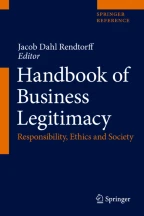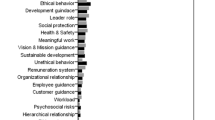Principles of Business Ethics and Business Legitimacy

In a report to the European Commission from an EU-BIO-MED-II Research Project with 22 Partners from different European countries, researchers proposed four ethical principles as guiding ideas for a European ethical and legal culture. Researchers had chosen to investigate the concepts of autonomy, dignity, integrity, and vulnerability. This research on bioethics and biolaw was mainly about how to give these ethical principles meaning in bioethics and law. However, during the research for this book emerged awareness that the ethical principles being classical ethical ideas with a fundamental significance for European culture do not only apply in bioethics but might have significance in other ethical fields, in particular business ethics, corporate social responsibility and business legitimacy.
This chapter shows how the values of autonomy, dignity, integrity, and vulnerability can be applied in business ethics as the basis for business legitimacy. In this perspective, the ethical principles constitute a core of protection of human persons including their rights to economic development and the duty of civil society and its corporations not to let human beings be eliminated in subhuman conditions of poverty and misery. The argument is that the concepts of basic ethical principles have fundamental significance both at the individual and at the organizational level – and in addition that they provide an important foundation for ethical standards of sustainability in a future global culture of human rights. The chapter provides a brief outline of the meaning of the concepts in business ethics illustrated by some examples of the uses of the concepts in different fields of business ethics as the foundation of business legitimacy.
This is a preview of subscription content, log in via an institution to check access.
Access this chapter
Subscribe and save
Springer+ Basic
€32.70 /Month
- Get 10 units per month
- Download Article/Chapter or eBook
- 1 Unit = 1 Article or 1 Chapter
- Cancel anytime
Buy Now
Price includes VAT (France)
eBook EUR 695.49 Price includes VAT (France)
Hardcover Book EUR 738.49 Price includes VAT (France)
Tax calculation will be finalised at checkout
Purchases are for personal use only
Similar content being viewed by others

Principles of Business Ethics and Business Legitimacy
Chapter © 2020

The Honest Businessperson: Cosmopolitan Theory and Cultural Praxis (The Example of Denmark and Scandinavia)
Chapter © 2019

The Perception of Business Ethics in the Public and Private Sectors: a Study of Portuguese Social Representations
Article 31 March 2022
References
- Badaracco JF Jr, Ellsworth RF (1991) Leadership and the quest for integrity. Harvard Business School Press, Boston Google Scholar
- Boatright JR (1998) Does business ethics rests on a mistake. Presidential Address to the Society for Business Ethics, 1998, Printed in Business Ethics Quarterly, 1999 Google Scholar
- Brenkert G (1998) Marketing for the vulnerable. In: Pincus Hartman L (ed) Perspectives in business ethics. Irwin McGraw-Hill, Chicago Google Scholar
- Driscoll D-M, Hoffmann MW (2000) Ethics matters. In: How to implement values-driven management. Center for Business Ethics, Bentley College, Boston Google Scholar
- Dworkin R (1986) Law’s empire. Harvard University Press, New York Google Scholar
- Elkington J (1999) Cannibals with forks, the triple bottom line of 21st century business. Capstone, Oxford Google Scholar
- Etzioni A (1988) The moral dimension of the economy. The Free Press, New York Google Scholar
- Freeman RE (1984) Stakeholder management, a strategic approach. Pitman, Boston Google Scholar
- Friedman M (1970) The social responsibility of business is to increase its profit. New York Times Magazine Google Scholar
- Fukuyama F (1995) Trust. The Free Press, New York Google Scholar
- Goodpaster K (1991) Business ethics and stakeholder analysis. Bus Ethics Q 1(1):53–73 ArticleGoogle Scholar
- Jørgensen K, Rendtorff JD (2018) Patient participation in mental health care – perspectives of healthcare professionals: an integrative review. Scand J Caring Sci 32(2):490–501 ArticleGoogle Scholar
- Jørgensen K, Rendtorff JD, Holen M (2018) How patient participation is constructed in mental healthcare: a grounded theory study. Scand J Caring Sci 32(4):1359–1370 ArticleGoogle Scholar
- Kemp P, Rendtorff J, Johansen NM (eds) (2000) Bioethics and Biolaw, Vol I–II. Rhodos International Publishers, Copenhagen Google Scholar
- Paine LS (1994) Managing for organizational integrity. Harvard College, Boston. Harvard Business Review Google Scholar
- Rawls J (1971) A theory of justice. Oxford University Press, Oxford Google Scholar
- Rendtorff JD (1997) Legislation, bioethics, judgement. In: Rechtstheorie, Beiheft, vol 19. Duncker & Humblot, Berlin, pp 211–222 Google Scholar
- Rendtorff JD (1998) The second international conference about bioethics and biolaw: European principles in bioethics and biolaw. Med Health Care Philos 1–4:271–274. Kluwer Academic Publishers ArticleGoogle Scholar
- Rendtorff JD (2002) Basic ethical principles in European bioethics and biolaw: autonomy, dignity, integrity and vulnerability – towards a foundation of bioethics and biolaw. Med Health Care Philos 5:235–244. Kluwer Academic Publishers ArticleGoogle Scholar
- Rendtorff JD (2003) Bioethics in Denmark. In: Peppin JF, Cherry MJ (eds) The annals of bioethics. Regional perspectives in bioethics. Swets & Zeitlinger Publishers, Lisse, pp 209–224 Google Scholar
- Rendtorff JD (2005) Retsfilosofi. Samfundslitteratur, København Google Scholar
- Rendtorff JD (2008) The limitations and accomplishments of autonomy as a basic principle in bioethics and biolaw. In: Weisstub DN, Pintos GD (eds) Autonomy and human rights in health care. An international perspective. International library of ethics, law, and the new medicine, vol 36. Springer, Dordrecht, pp 75–87 Google Scholar
- Rendtorff JD (2009a) Basic ethical principles applied to service industries. Serv Ind J 29(1):9–19 ArticleGoogle Scholar
- Rendtorff JD (2009b) Responsibility, ethics and legitimacy of corporations. Copenhagen Business School Press, Copenhagen Google Scholar
- Rendtorff JD (2010a) Philosophy of management: concepts of management from the perspectives of systems theory, phenomenological hermeneutics, corporate religion and existentialism. In: Koslowski P (ed) Elements of a philosophy of management and organization. Studies in economic ethics and philosophy. Springer, Heidelberg, pp 19–47 Google Scholar
- Rendtorff JD (ed) (2010b) Power and principle in the market place: on ethics and economics. Ashgate, London Google Scholar
- Rendtorff JD (2011) Institutionalization of corporate ethics and social responsibility programs in firms. In: Buhmann K, Roseberry L, Morsing M (eds) Corporate social and human rights responsibilities: global, legal and management perspectives. Palgrave Macmillan, London, pp 244–266 ChapterGoogle Scholar
- Rendtorff JD (2013a) The history of the philosophy of management and corporations. In: Luetge C (ed) Handbook of the philosophical foundations of business ethics. Springer Science+Business Media, Dordrecht/Heidelberg/New York/London, pp 1387–1408 ChapterGoogle Scholar
- Rendtorff JD (2013b) Basic concepts of philosophy of management and corporations. In: Luetge C (ed) Handbook of the philosophical foundations of business ethics. Springer Science+Business Media, Dordrecht/Heidelberg/New York/London, pp 1361–1386 ChapterGoogle Scholar
- Rendtorff JD (2013c) Philosophical theories of management and corporations. In: Luetge C (ed) Handbook of the philosophical foundations of business ethics. Springer Science+Business Media, Dordrecht/Heidelberg/New York/London, pp 1409–1432 ChapterGoogle Scholar
- Rendtorff JD (2013d) Recent debates in philosophy of management. In: Luetge C (ed) Handbook of the philosophical foundations of business ethics. Springer Science+Business Media, Dordrecht/Heidelberg/New York/London, pp 1433–1457 ChapterGoogle Scholar
- Rendtorff JD (2014a) French philosophy and social theory. A perspective for ethics and philosophy of management. Springer International Publishers, Cham Google Scholar
- Rendtorff JD (2014b) Risk management, banality of evil and moral blindness in organizations and corporations. In: Luetge C, Jauernig J (eds) Business ethics and risk management. Ethical economy No 43. Springer Science+Business Media, Dordrecht, pp 45–71 Google Scholar
- Rendtorff JD (2014c) European perspectives. In: ten Have HAMJ, Gordijn B (eds) Handbook of global bioethics. Springer Science+Business Media B.V, Dordrecht/Heidelberg/New York/London Google Scholar
- Rendtorff JD (2015a) Business ethics, strategy, and organizational integrity: the importance of integrity as a basic principle of business ethics that contributes to better economic performance. In: Palmer DE (ed) Handbook of research on business ethics and corporate responsibilities. Advances in Business Strategy and Competitive Advantage (ABSCA). IGI Global, Herschey, pp 91–105 Google Scholar
- Rendtorff JD (2015b) Integrity, concept of. In: ten Have H (ed) Encyclopedia of global bioethics. Springer Science+Business Media B.V, Cham, pp 1–7 Google Scholar
- Rendtorff JD (2017a) Cosmopolitan business ethics: towards a global ethos of management. Finance, governance and sustainability: challenges to theory and practice series. Routledge, London BookGoogle Scholar
- Rendtorff JD (2017b) Creating shared value as institutionalization of ethical responsibilities of the business corporation as a good corporate citizen in society. In: Wieland J (ed) Creating shared value: concepts, experience, criticism. Ethical Economy No 52. Springer, Cham, pp 119–139 ChapterGoogle Scholar
- Rendtorff JD (2017c) Business ethics, philosophy of management, and theory of leadership. In: Rendtorff JD (ed) Perspectives on philosophy of management and business ethics: including a special section on business and human rights. Ethical economy No 51. Springer, Cham, pp 3–17 Google Scholar
- Rendtorff JD (2019a) The concept of business legitimacy: corporate social responsibility, corporate citizenship, corporate governance as essential elements of ethical business legitimacy. In: Crowther D, Seifi S, Wond T (eds) Responsibility and governance: the twin pillars of sustainability. Approaches to global sustainability, markets, and governance. Springer VS, Singapore, pp 45–60 Google Scholar
- Rendtorff JD (2019b) Sustainable development goals and progressive business models for economic transformation. Local Econ 34(6):510–524 ArticleGoogle Scholar
- Rendtorff JD (2019c) Philosophy of management and sustainability: rethinking business ethics and social responsibility in sustainable development. Emerald Group Publishing, Bingley Google Scholar
- Rendtorff JD (2019d) The honest businessperson: cosmopolitan theory and cultural praxis (the example of Denmark and Scandinavia). In: Lütge C, Strosetzki C (eds) The honorable merchant – between modesty and risk-taking: intercultural and literary aspects. Ethical Economy No 56. Springer, Cham, pp 41–53 ChapterGoogle Scholar
- Rendtorff JD, Kemp P (2000) Basic principles in European bioethics and biolaw, autonomy, dignity, integrity, vulnerability, Vol. I–II. Center for Ethics and Law, Barcelona/Copenhagen Google Scholar
- Rendtorff JD, Kemp P (2009) The Barcelona declaration. Towards an integrated approach to basic ethical principles. Synth Philos 23(2):239–251 Google Scholar
- Rendtorff JD, Kemp P (2019) Four ethical principles in European bioethics and biolaw: autonomy, dignity, integrity and vulnerability. In: Valdés E, Lecaros JA (eds) Biolaw and policy in the twenty-first century: building answers for new questions. International library of ethics, law, and the new medicine, vol 78. Springer, Cham, pp 33–40 ChapterGoogle Scholar
- Thyssen O (1997) Værdiledelse. Gyldendal, København Google Scholar
- Ulrich P (1997) Integrative Wirtschaftsethik: Grundlagen einer lebensdienlichen Ökonomie. 5. Auflage. Haupt, Bern Google Scholar
- Walzer M (1987) Interpretation and social criticism. Harvard University Press, New York Google Scholar
- World Commission on Environment and Development (1987) Our common future. Oxford University Press, Oxford Google Scholar
Author information
Authors and Affiliations
- Department of Social Sciences and Business, Roskilde University, Roskilde, Denmark Jacob Dahl Rendtorff
- Jacob Dahl Rendtorff


